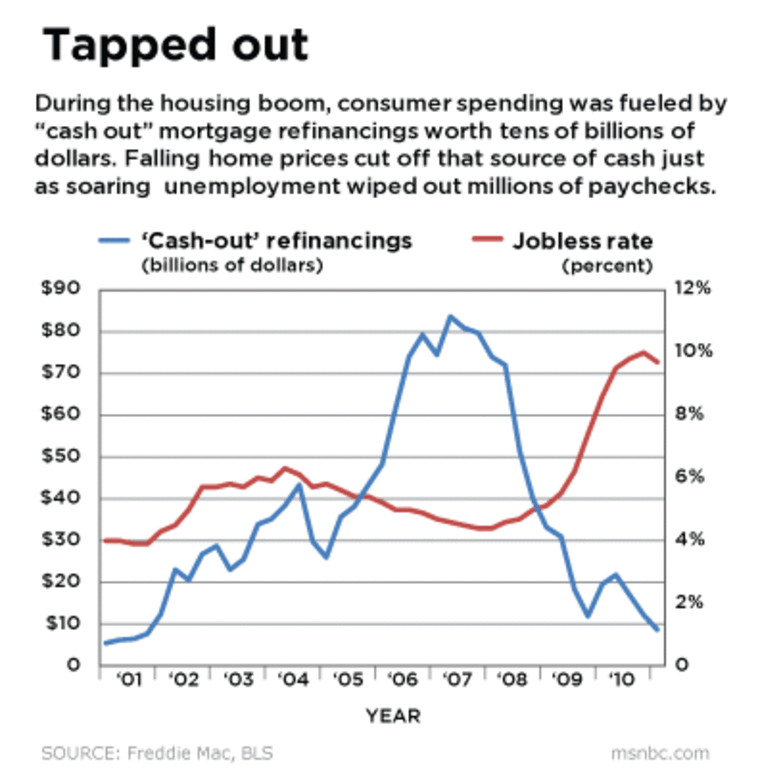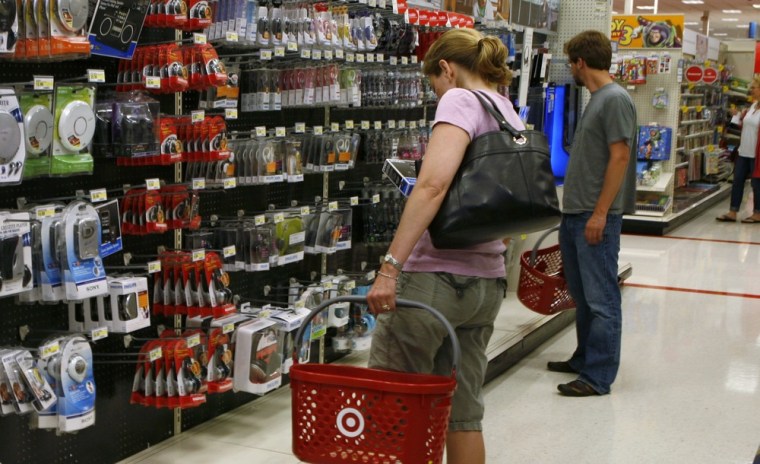In past U.S. recessions, consumers tightened their belts when the economy was contracting, and began spending again once growth returned. This time may be different.
The hope was that the government’s massive stimulus spending program last year would break the economy’s downward spiral and spur businesses to expand and consumers to start spending again.
The stimulus certainly produced the desired effect — over the short run. Economic growth, as measured by the Gross Domestic Product, surged in the second half of 2009 before cooling off in the first half of this year. Until recently, most economists expected the economy to continue expanding by about three percent a year. But in the past two months, those forecasts have begun to edge lower.

“The economy entered the second quarter with plenty of momentum, and exited it with very little,” IHS Global Insight Chief U.S. Economist Nigel Gault wrote in a note to clients Wednesday. “The evidence does not look so poor as to signal the dreaded 'double-dip recession,' but at a minimum it does signal slower growth in the second half of the year.”
The government stimulus package was supposed to get the economic gears turning again, led by consumer spending. But there are signs that critical component may remain stuck for longer than in past textbook recoveries.
Readers, is the economy forcing you to be a really long-distance commuter?
The latest sign came Thursday as retailers reported lackluster sales results for June, when shoppers focused on deeply discounted clothing. A separate report showed a drop in new unemployment claims, but the numbers remain high enough to point to a very weak job market.
On Wednesday, President Obama repeated his call for policies to spur exports, warning that the U.S. could no longer rely on American consumer spending to fuel future economic growth.
"This is where American jobs will be tomorrow," Obama said. "Ninety-five percent of the world’s customers and fastest-growing markets are beyond our borders."
It’s not hard to see why. Since the housing boom turned to bust, trillions of dollars of housing wealth have evaporated. An historic surge in unemployment has destroyed millions of paychecks. And the lending spree that brought the global financial system to the brink of collapse has left American households buried under a mountain of debt that will take years to pay off.
“The overhang of leverage is certainly a big issue,” said Jeffrey Rosenberg, Bank of America's chief credit strategist. “It's going to be with us for a long time and take a long time to work through.”
So will high levels of unemployment. Even at 3 percent GDP growth, it would take years to replace the jobs lost to the recession.
The numbers look something like this: On top of the 8.3 million workers who were laid off since the recession began, another 3 million or so jobs, or about 100,000 a month, were needed to keep up with the growth of the work force. So even if the economy now begins producing an average of 250,000 net new jobs every month, year in, year out, employment wouldn’t be back to pre-recession levels until at least 2016.
“Unfortunately it’s going to last a long time,” Mohamed El-Erian, co-CEO of the investment firm Pimco told CNBC. ”It's not just about the level. It's about the structural dimensions of the unemployment.”
That means many of the jobs that were lost the recession may never come back, says El-Erian. He notes that more than half of those out of work have been jobless for more than 26 weeks; the average length of unemployment is 35 weeks.
“These are structural aspects which cannot be solved overnight and cannot be solved with a cyclical mind-set,” he said.
American households are in much worse shape than in past recovery cycles.
From the end of the last recession in November 2001 to the beginning of the latest downturn in December 2007, American homeowners cashed out more than $1.2 trillion worth of home equity, roughly five times the amount of cash-out refinancing from the previous decade.
That cash is gone, along with the rising house prices that drove the creation of that wealth. Many households are still paying off the pile of debt they took on to finance the spending that drove the last economic expansion.
It’s a huge pile. From the end of the last recession, total consumer debt outstanding jumped from $1.1 trillion to a peak of $2.6 trillion in July, 2008, an increase of $1.45 trillion in less than seven years. When bankers started canceling credit cards after the financial Panic of 2008, that level began edging lower, but has only fallen by about $150 billion.
On Thursday, the Federal Reserve said consumer borrowing fell again in May as Americans remained jittery about their household finances and the strength of the economic recovery.
Paying off that multi-trillion-dollar debt pile is getting harder as incomes have stalled. As of the first quarter of this year, total personal income was about where it was when the recession began.
Income from savings and investment is also being squeezed. The near-collapse of the banking system brought a government bailout that included an unprecedented policy of pushing interest rates to zero. That helped bankers rebuild their own battered balance sheets.
But that bailout has cost American savers dearly; the flip side of the Fed’s aggressive rate cutting is the tiny returns being paid on bank deposits, money market savings and Treasuries.
Those low interest rates, along with generous government tax breaks, were supposed to help the housing industry get back on its feet. But after a steep plunge in home sales last month, it remains to be seen whether the momentum can be sustained now that those tax breaks have expired.
“We're very much worried about what might become of the housing market,” said John Lonski, chief economist at Moody's Investors Service. “Further price declines for real estate (could) delay a restoration of the supply of credit from financial institutions to consumers and small-to-medium-sized businesses.”
Consumers also face the headwind of expiring income tax credits included in last year’s stimulus package. And for those without a paycheck, the safety net of jobless benefits is being stretched to the breaking point.
Congress is currently debating whether to approve another extension of federal jobless benefits, which now cover those who have been out of work for as many as 99 weeks. The House recently passed another extension, but the measure is stalled in the Senate, where opponents worry about the impact on a federal deficit already swollen from rescuing the financial system and stimulating the economy.
Critics of extending benefits also point to economic research showing that repeatedly extending benefits may prolong unemployment by allowing workers to turn down job offers in hopes of finding a better one.
But unless Congress acts, more than three million people are expected to run out of benefits by the end of this month, leaving many with little means of support.
“This is not an agrarian economy; you don’t go out and look for roots and berries when you don’t have a job,” said Robert Brusca, chief economist for Fact and Opinion Economics. “You want to be careful how you pull the rug out from underneath people.
The debate over extending jobless benefits will intensify as the political campaign picks up in the coming months. And if, as some economists expect, unemployment levels remain stubbornly high, the debate will likely continue long after the election is over.
“Our social safety nets are built on the assumption that we cannot have persistently high structural unemployment,” El-Erian said. “The reality is we're going through a realignment and our safety nets are simply too weak.”
